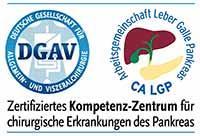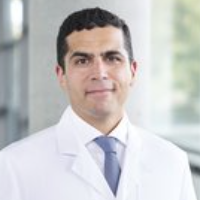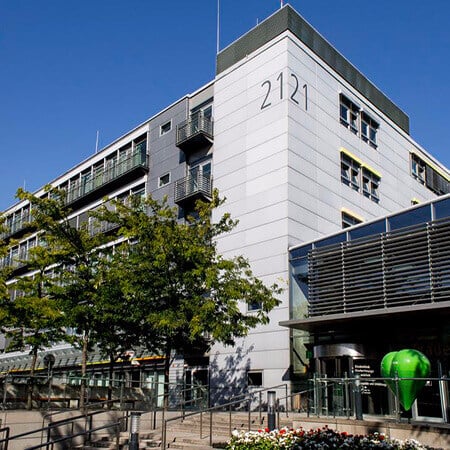Stomach Cancer — CRS and HIPEC - Hyperthermic Intraperitoneal Chemoperfusion: treatment in the Best Hospitals of Germany
Treatment prices are regulated by national law of the corresponding countries, but can also include additional hospital coefficients. In order to receive the individual cost calculation, please send us the request and medical records.
Stomach Cancer Treatment in Germany
- Stomach (gastric) cancer
- Diagnosis and conservative treatment with 1 course of chemotherapy
- Surgical partial resection of the stomach
- Surgical complete resection of the stomach and further plasty of intestinal tissue
- Embolization or chemoembolization
- Therapy with Lutetium-177-DOTATATE (Lu-177)
- Chemotherapy

Department of General, Abdominal, Transplant, Hepatopancreatobiliary, Colorectal, Endocrine, Bariatric Surgery and Hernia Surgery
The Department of General, Abdominal, Transplant, Hepatopancreatobiliary, Colorectal, Endocrine, Bariatric Surgery and Hernia Surgery provides the full range of services in the areas of its specialization and holds a leading position at the national and international levels in terms of the number of surgical interventions performed and their success. Of particular interest are operations for treating diseases of the bowel, stomach, esophagus, pancreas, liver, gallbladder, and bile ducts, and endocrine glands. The department's doctors have excellent skills in the surgical treatment of cancer, surgery for liver, kidney, pancreas, and small intestine transplants, and operations for morbid obesity. The department's operating rooms are the pride of the medical facility, since they have all the necessary technical options for performing operations with the da Vinci surgical system, image-guided interventions, and endoscopic surgical procedures, which are characterized by minimal trauma rates.







Department of General and Abdominal Surgery, Hepatopancreatobiliary Surgery, Colorectal Surgery, Endocrine Surgery, Hernia Surgery and Bariatric Surgery
The Department of General and Abdominal Surgery, Hepatopancreatobiliary Surgery, Colorectal Surgery, Endocrine Surgery, Hernia Surgery and Bariatric Surgery offers the full range of effective surgical treatments in accordance with modern medical standards. Operations of varying complexity are performed on the stomach, colon, pancreas, liver, gallbladder, bile ducts, rectum, thyroid gland, and parathyroid glands in the department's operating rooms every day. The department's primary focus is the surgical treatment of malignant gastrointestinal tumors. The medical facility is certified in this area by the German Cancer Society (DKG). The team of endocrine surgeons specializes in the treatment of diseases of the thyroid gland, parathyroid glands, and adrenal glands. Patients with morbid obesity are also successfully operated on here. In their work, the department’s specialists primarily use minimally invasive surgical techniques, which virtually eliminate trauma to healthy tissue during the intervention. The department's operating suite is equipped with an innovative da Vinci Surgical System, which allows the doctors to perform sparing and high-precision surgical interventions. The specialists of the medical facility strictly adhere to hygiene and safety standards and create the most comfortable conditions for each patient during their hospital stays.







Department of Abdominal and Colorectal Surgery, Hepatobiliary Surgery, Hernia Surgery, Bariatric Surgery, Endocrine Surgery, Thoracic and Vascular Surgery
The Department of Abdominal and Colorectal Surgery, Hepatobiliary Surgery, Hernia Surgery, Bariatric Surgery, Endocrine Surgery, Thoracic and Vascular Surgery offers the full range of services in these medical fields. It provides surgical treatment of diseases of the gastrointestinal tract, thyroid and parathyroid glands, thoracic organs, vascular system, rectum, anus and colon. In addition, the department performs bariatric interventions for the treatment of morbid obesity. A special focus is made on the treatment of gastrointestinal cancer. Minimally invasive surgical techniques are always preferred, if clinically indicated. The team of the department's surgeons has 8 progressive operating rooms equipped with everything necessary for successful treatment. The department also has the da Vinci Xi surgical system for high-precision minimally invasive robot-assisted interventions. The patient's health is in the safe hands of the best German surgeons who have gone through a rigorous selection and have vast clinical experience.






Peritoneal carcinomatosis is the most unfavorable type of stomach cancer progression. Metastases spread throughout the peritoneum, affecting organs and tissues. However, even in such cases, effective treatment options exist, and they are already being used in German hospitals. Cytoreductive surgery (CRS) and hyperthermic intraperitoneal chemotherapy (HIPEC) are used to treat stomach cancer in Germany. When performing surgery, doctors remove all detected malignant tumors and then rinse the abdominal cavity with a heated chemotherapy solution that destroys the remaining small clusters of cancer cells. You can benefit from this treatment method in a German hospital by making a treatment appointment through the Booking Health service. On our website, you can find out the cost of cancer treatment in Germany, compare the cost of services in different hospitals and departments of oncology, and choose the most suitable option at the best price.
Content
- When can CRS and HIPEC be used for stomach cancer?
- What is CRS and HIPEC for stomach cancer?
- When and how is CRS and HIPEC performed for stomach cancer?
- Where can I get treatment for stomach cancer?
When can CRS and HIPEC be used for stomach cancer?
In most hospitals worldwide, the standard treatment for stage IV stomach cancer that has spread to the peritoneum is systemic chemotherapy. However, only a quarter of patients respond positively to this treatment. The median survival rate with this method of cancer treatment is 10 months.
Peritoneal carcinomatosis is the worst type of stage IV stomach cancer. About 80% of patients die in the first year after the detection of metastases. This form of the disease causes malignant ascites (fluid accumulation in the abdominal cavity), intestinal obstruction, and patient debilitation due to malnutrition.
However, medicine continues to advance, particularly in economically developed countries like Germany. Modern hospitals are implementing new treatment methods that can deal with even the most severe forms of stomach cancer. Cytoreductive surgery and HIPEC are considered the optimal options to help a patient with peritoneal carcinomatosis.
What is CRS and HIPEC for stomach cancer?
CRS is the surgical removal of all visible tumors. In medical and oncological terms, "cytoreduction" means that during the surgery, doctors strive to reduce the size of tumors.
In the case of stomach cancer, CRS involves the removal of the entire stomach along with the small and large omentum, lymph node dissection, and excision of the affected peritoneal areas.
The developer of cytoreductive surgery techniques for stomach cancer is P.H. Sugarbaker. During his research, CRS increased median patient survival by more than one and a half times.
Subsequently, these results were further improved after treatment with HIPEC. This is the injection of chemotherapy agents heated to 39-43 degrees Celsius into the abdominal cavity. The high temperature makes cancer cells more sensitive to cytostatics and allows the drugs to penetrate up to 3 mm deep into the peritoneum. The concentration of cytostatics in the abdominal cavity during treatment is 20 times higher compared to blood plasma because the absorption of drugs into the bloodstream is impeded by the hemoperitoneal barrier. As a result, doctors in cancer clinics are able to destroy cancer cells without any severe systemic side effects.
When and how is CRS and HIPEC performed for stomach cancer?
HIPEC has shown its effectiveness not only for disseminated stomach cancer but also for resectable (removable) stomach cancer. Rinsing the abdominal cavity with cytostatics reduces the risk of malignancy recurrence after stomach removal.
HIPEC is used in most hospitals after cytoreductive surgery for disseminated cancer. It makes sense to perform it if all tumor foci have been removed (complete cytoreduction in CC-0 volume) and the initial spread of cancer throughout the peritoneum was minimal (peritoneal carcinomatosis index less than 7).
Once a patient with stomach cancer is admitted to the hospital, a diagnosis is carried out to determine if cytoreductive surgery can be performed. If there are many tumors and they are too large, systemic chemotherapy is indicated to shrink the tumor foci. Cytoreductive surgery is then performed. Based on its results, a decision is made about whether to perform intraperitoneal chemotherapy. If the surgeon at the cancer clinic is able to remove all the tumor foci, HIPEC is performed immediately after surgery. The abdominal cavity is rinsed with cytostatics for 1-1.5 hours.
In medicine, there is another approach to the combination of CRS and HIPEC for stomach cancer. Since 2014, specialized cancer centers have been using the following sequence of these procedures:
- LS-HIPEC, laparoscopic hyperthermic intraperitoneal chemotherapy
- Cytoreductive surgery
It is assumed that if the tumor foci are initially shrinked with HIPEC, it will be easier to remove them completely, further reducing the cost of surgery. However, the clinical outcomes of this approach are not yet fully known, and only a limited number of medical facilities employ it. The more common approach in medicine and oncology is to perform the surgery first and then apply HIPEC. Research shows that surgery and hyperthermic intraperitoneal chemotherapy can achieve a median survival rate of more than a year and a half.
Where can I get treatment for stomach cancer?
You can undergo treatment in Germany. This country is known for its top-class healthcare and oncology services. Cancer treatment in Germany with CRS and HIPEC is available in many clinics. The specialists in German cancer centers have vast experience in these techniques and therefore achieve excellent results.
Cancer treatment in Germany is effective due to the experience and skill of surgeons. In most cases, doctors manage to perform complete cytoreduction, which creates prerequisites for follow-up successful HIPEC. After cancer treatment in Germany using a combination of these methods, systemic chemotherapy is performed, which further increases the survival rate of patients.
You can make an appointment for your treatment in Germany on the Booking Health website. On our website, you can find the best German hospitals, find out the cost of treatment in Germany, compare prices at different hospitals, and select the best option based on the combination of cost and quality of oncology services. If you make your appointment for stomach cancer treatment in a German hospital through the Booking Health website, the prices will be lower than usual. The cost of services in German hospitals is reduced due to the lack of additional coefficients from foreign patients.
Authors:
The article was edited by medical experts, board certified doctors Dr. Nadezhda Ivanisova and Dr. Vadim Zhiliuk. For the treatment of the conditions referred to in the article, you must consult a doctor; the information in the article is not intended for self-medication!
Sources:

